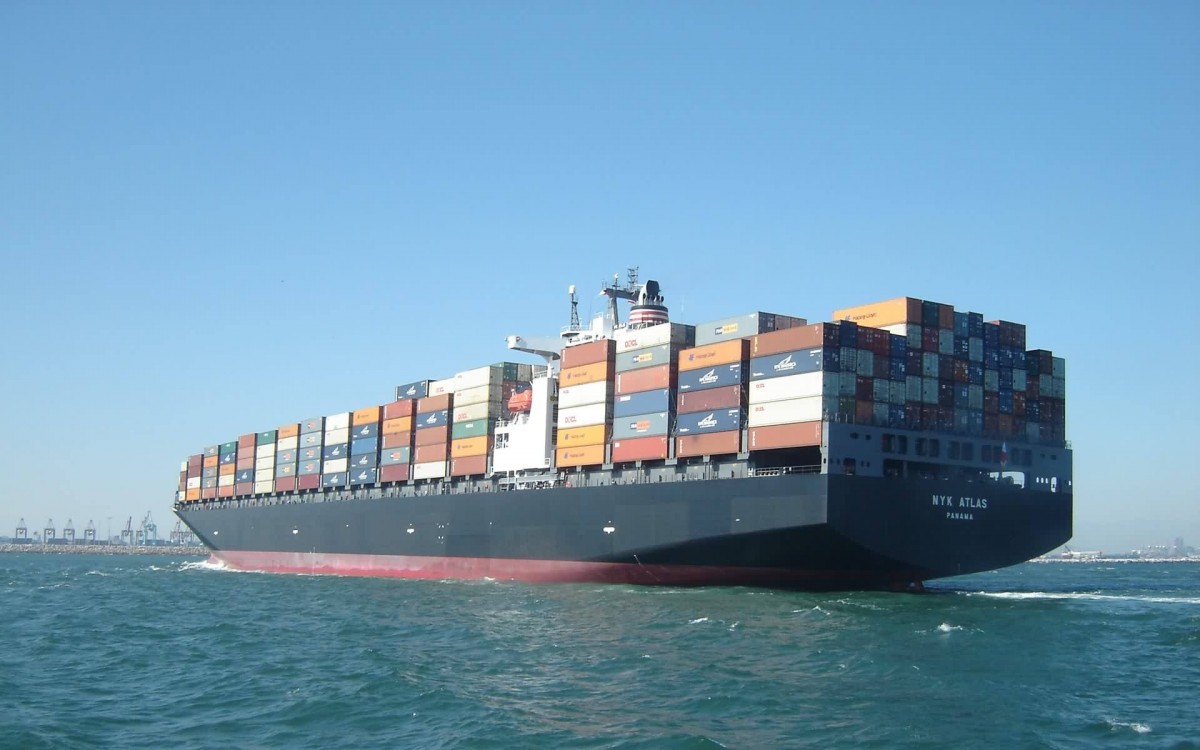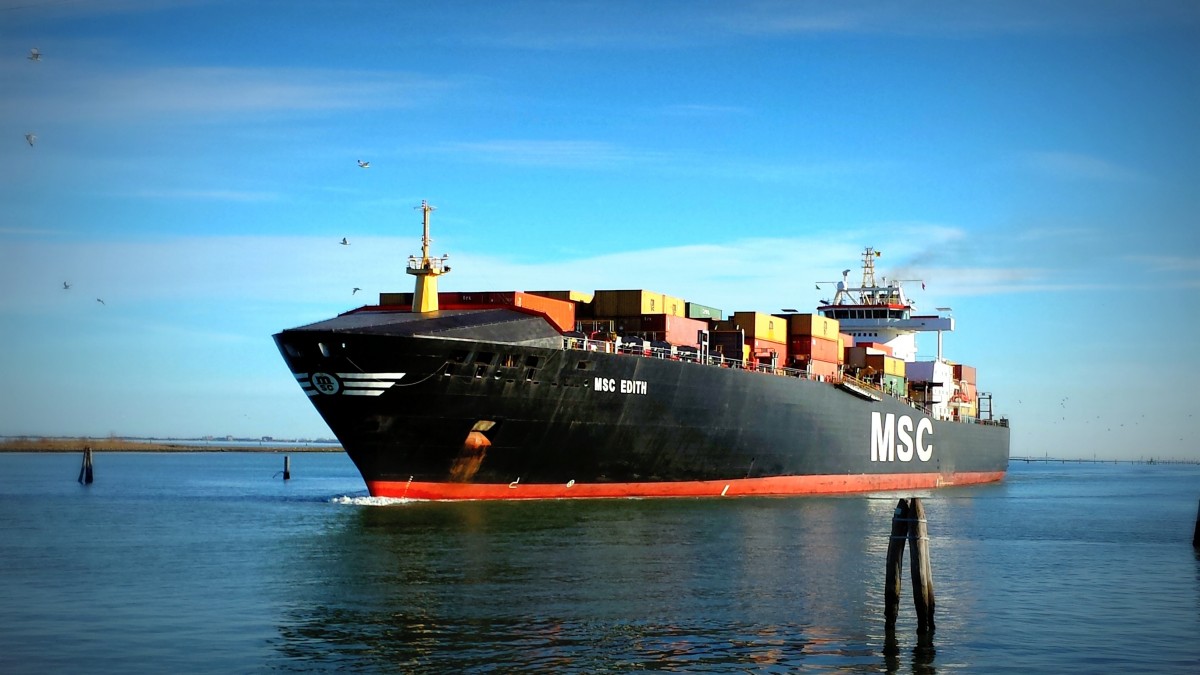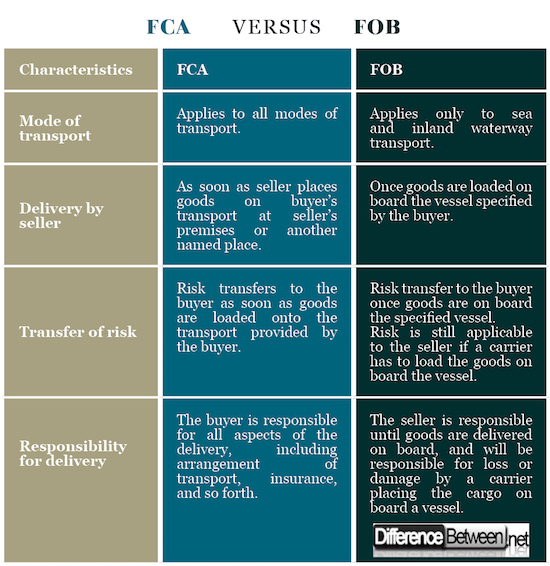Difference Between FCA and FOB
Imports and exports happen on a daily basis across the globe. Moving goods across borders can often create confusion and once issues appear it becomes difficult to know who is responsible, or which country’s laws are applicable. For this reason the International Chamber of Commerce established the Incoterms® (International Commerce Terms).
Incoterms® address certain aspects of international trade: costs, risks, and responsibility, all pertaining to delivery. Using one of the 11 Incoterms® ensures that it is clear who will pay delivery costs, who carries risks pertaining to the delivery, and who is responsible for the delivery of the goods.
The Incoterms® FCA and FOB appear very similar at first but subtle differences exist between the two classifications.
What is FCA?
FCA, the abbreviation for Free Carrier, is applicable to all modes of transport and where more than one mode of transport may be used for the delivery of goods. With Free Carrier the seller makes the goods available to the buyer at the premises of the seller and loads them onto the transport arranged by the buyer. The buyer can also nominate a different party to accept the goods, or have the goods delivered at a different place, however, this must be clearly stated in the agreement. All risk associated with the goods will transfer to the buyer as soon as the goods are made available by the seller.
As soon as the seller has loaded the goods onto the transport supplied by the buyer, then the seller has delivered the goods. All costs, risks, and responsibility for the goods is then for the buyer’s account. The buyer will be responsible for arranging the transport and paying costs for transport, insurance and customs. However, the seller is responsible for clearing the goods at Customs in order for the export to take place.
What is FOB?
FOB, the abbreviation for Free On Board, is applicable to goods traveling by sea or an inland waterway (e.g. a river). With Free on Board the seller has delivered the goods once they are place on board the shipping vessel. This should be at the agreed upon port of shipment. The buyer bears the risk once the goods are placed on the vessel. The buyer is also responsible for all associated costs from the time the goods are placed on board. FOB can also be applicable where goods already delivered on board are procured for another party – usually in relation to commodity sales.
The seller only needs to place the goods on board the vessel and ensure that the goods are cleared for export by Customs. Arranging cargo space upon a vessel, cargo costs, insurance costs, and any other costs are the responsibility of the buyer. The buyer should inform the seller of which vessel the goods must be loaded onto, delivery date, as well as any time restrictions, well in advance of the delivery date.
It is advisable that the seller actually places the cargo on board the vessel for delivery, and that the seller does not require the cargo to be loaded onto the vessel by a carrier. If a carrier is used then the risk will assume with the seller until such time as the goods are placed on board, for which the seller may not be fully insured.
Difference between FCA and FOB
-
Mode of Transport in FCA and FOB
FCA applies to all modes of transport; FOB applies to sea or inland waterway transport.
-
Delivery by seller
For FCA goods are delivered once placed onto the transport arranged by the buyer or delivered to the named place. For FOB goods are delivered when the seller places the cargo on board the vessel specified by the buyer.
-
Transfer of risk involved in FCA and FOB
With FCA risk of loss or damage to goods transfers to the buyer once goods are delivered. With FOB risk transfers to the buyer once goods are loaded on board the vessel; the buyer maintains risk for goods placed on board by another carrier.
-
Responsibility for delivery
FCA holds the buyer responsible for all aspects of the transaction after delivery is made by the seller and for arranging transport for the delivery. FOB holds the buyer responsible for all arrangements regarding the delivery of the goods, including arrangements regarding which vessel is to be used for delivery; the seller will be responsible if a carrier is used to place goods on board, and until goods are on board.
FCA vs. FOB: Comparison Chart: Free Carrier vs Free On Board
Summary of (Free Carrier vs Free On Board) FCA vs FOB
- FCA applies to all modes of transport; FOB only applies to transport by waterway or sea.
- FCA considers goods delivered once seller places goods on transport arranged by buyer. FOB considers goods delivered once seller places goods on board specified vessel.
- Arrangements for transport, transport costs, and insurance costs are the responsibility of the buyer.
- Risks transfers to the buyer once goods are placed on transport by the seller for both FCA and FOB.
- Both FCA and FOB require the seller to arrange for goods to be cleared for export by Customs.
- Difference Between TIN and TAN - June 20, 2018
- Difference Between Bitcoin and Litecoin - June 1, 2018
- Difference Between Walmart and Amazon - May 23, 2018
Search DifferenceBetween.net :
Leave a Response
References :
[0] “Incoterms® rules 2010.” International Chamber of Commerce.”2017. iccwbo.org/resources-for-business/incoterms-rules/incoterms-rules-2010/.
[1]Ramberg, Jan. “ICC Guide to Incoterms® 2010: Understanding and Practical use.” ICC Services Publications, 1999. store.iccwbo.org/content/uploaded/pdf/ICC-Guide-To-Incoterms%C2%AE-2010.pdf.
[2]“Difference between FCA and FOB in terms of delivery of goods.” How to Export Import, Dec. 14, 2017. howtoexportimport.com/Difference-between-FCA-and-FOB-in-terms-of-Deliver-502.aspx
[3]Image credit: https://pxhere.com/en/photo/917877
[4]Image credit: https://pxhere.com/en/photo/748869



